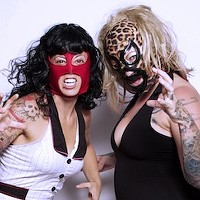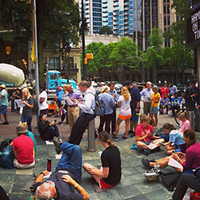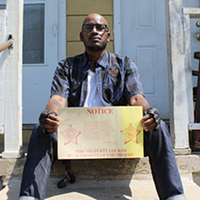Throughout his career, filmmaker and hip-hop artist Jeff Lucky has lived, died and lived again.
His story has played out in every medium imaginable — from newspapers and magazines (including The New York Times and Sports Illustrated) to television shows (on networks like Fox News and CNN) and film.
Owner of the production company Dark Prometheus Films, he finds inspiration in the Greek god who brought fire to man — and as punishment, was bound to a rock where an eagle ate away his liver every day. "The whole metaphor of Prometheus ... it's not literally just giving fire, it's giving enlightenment, knowledge, culture, information — giving of oneself to the people," he says. "I don't focus on the fact that he had to sacrifice for the people; I focus more on the fact that no matter how many times the eagle ate away his liver, it always [came] back."
Lucky the filmmaker was a top finalist in the Independent Film Channel's Absolut World Filmmaking Challenge for his short film Little Mama, and he was recognized by the Sundance Institute for his short When It Hurts. A recent project, Power: The Seven Day Theory, was a 2010 quarterfinalist for the Academy of Motion Picture Arts and Sciences' Nicholl Fellowships in Screenwriting. He has also written for television and says he still gets e-mails from fans in countries as diverse as The Netherlands, Spain and France for his work on a hit series that aired in 2009 (more on that later).
Lucky the hip-hop artist has been making music since 1993. A former member of the rap crew DPS (Dirty Pretty Shit), he is now president of the independent label SummerSoul Records. On Jan. 11, 2011, he released his first solo album, Soul Motivation, a project he calls "the end of my beginning." The story of how he got to this ending begins in Charlotte 32 years ago.
He lived
Three girls, one boy, a mama and a daddy. Namesake to his father, Lucky was born Jeff Moonie Jr. in 1978. Growing up, his role model was Jack Kemp, the NFL player turned politician. Lucky imagined he could be like Kemp someday, except football didn't work out. While listening to groups like NWA and A Tribe Called Quest, he found young black men who understood where he was coming from, who got him.
Drawn to the feeling of empowerment the music and lyrics gave him, Lucky decided music was as good a way as any to get his point across and effect change. He started calling himself a rapper. But a conversation with his sister, Cherica Adams, made him challenge the notion of who — and what — he was.
"I had a car ride with my sister, my late sister, that changed my life," he says. "I was riding with her, and I said, 'Yeah, I'm a rapper. I'm going to make films and I'm a rapper too.' And she was like, 'If you're a rapper, what are you doing?' And I didn't have an answer. And so when I couldn't answer, she was like, 'If you're not doing anything — you're not making songs, you're not trying to get on — you might as well not do it at all.' And she turned around and picked up a Vibe magazine, and she booked me a record and film seminar in Atlanta."
Adams and Lucky soon took a road trip down to the ATL, where he freestyled for Dallas Austin's producers (the same Austin who has produced music for artists such as Michael Jackson, Madonna, TLC and Gwen Stefani) and rapped for Shakir Stewart, the former executive vice president of Def Jam Records. "[Cherica] actually dropped everything that she was doing to manage me," Lucky says. "When she dropped me in the mix like that, we were making serious contacts. But me being a teenager then, I didn't understand how long it takes for the whole process to work itself out."
Though he was unprepared for how long things took ("I thought that if you go to Dallas Austin's studio and you know somebody in there," he recounts, "that, aye, you should have a CD out in two months.") Lucky says he thrived on the experience. But soon after Adams put him on the music scene, tragedy struck and his life spiraled out of control.
He died
Two girls, one boy, a mama and a daddy. In 1999, Adams was murdered by a hitman hired by former Charlotte Panthers wide receiver Rae Carruth. "Everything was just derailed," says Lucky. "We had a lot of momentum, I was meeting people, we were making music and then after that, it was just nothing. It was just me sitting around looking like 'What happened'?"
A national spectacle drawn out over radio and airwaves, including three months on Court TV, is what happened. Lucky says the experience drove him into a deep hole and left him unable to create. "When you have something like that played out in front of everyone, and you have people approaching you — you know, I had to turn on the radio and hear people say all manner of vile things about my sister after she was already deceased — it makes you so bitter toward the public in general, that you don't wanna give them anything at all.
"I didn't create for years after my sister was killed. I couldn't even write an Irish limerick," he says. "And it's because you feel like all these people are invading your life [and] they don't deserve anything. ... And at the time, I was so angry and bitter toward the people, I didn't wanna give them anything at all. And that was destroying me — because then I couldn't get the stuff out. And I was just becoming a worse and worse and worse person."
He lives again
Two girls, one boy, a mama. In 2005, two weeks after Lucky received the top award at the Asheville Film Festival for his documentary Donor, he lost his father, Jeff Moonie Sr. — the subject of the film — to Graft-Versus-Host disease.
Lucky says his father's death helped him collect himself and figure out how to move forward. "As opposed to my sister, where I kinda dove into a hole, and I ran into a wall and I couldn't create," he says, "I was like, 'Now people gone think I got shot out of a cannon — 'cause I gotta do both these things: film and music. And I'm gonna work harder, more ardently and more passionately than anyone.'"
Three years later, Lucky, a graduate of UNC-Chapel Hill in media studies and production, moved to California to make movies. The music kept calling him, though. Many of the tracks on Soul Motivation began writing themselves during his time there. "When I first moved to Los Angeles, I just had a suitcase. I didn't even have a car. I didn't have anything," he says. "I would walk around Hollywood all the time, and 'Don't Worry,' the lyrics to that [song] is what I would say in my head to motivate myself."
Lucky landed a job writing music for the CBS police drama, Cold Case. His song "Read Between the Lines" propelled the 2009 episode of the same name to one of the highest-rated of the season. Lucky says it also marked the first time in the history of the series that producers allowed someone to write a song that a show was centered around.
"I moved to L.A. to make movies only — or at least I thought," he says. "People told me that you gotta do either one or the other; you gotta choose if you don't wanna suffer. And I realized that for me to be me and express myself properly, that two things [music and film] always have to go together. [Soul Motivation] is me coming to that understanding — that I need these two things to function properly."
Lucky says the majority of the 14-track album was recorded in two days, but adding the finishing touches — the transitions, live instruments and "character" — took almost a year. Produced by Brice Lampkin, the album includes fun numbers like "Needles" and "Soul Glo" (That song's video, by the way, earned a 100-percent "funny" rating on the comedy website Funnyordie.com.) and more contemplative ones like the title track "Soul Motivation" and "Custom Gators," a song about Lucky's experience losing a baby. And though Lucky says he won't rest "until anyone who can be moved by this album is exposed to it," he is already looking to his next projects.
His record label, SummerSoul Records (named for his sister Cherica), is a joint enterprise with his younger sister Janalyn Walton and manager Will Hill. "We're representing the stuff [my sister] would be doing right now, her true legacy," he says. "We want to separate her from just the way she ended. She was so much bigger and so much more important than that." Two films are also in the works, including one set in L.A. (for which he is creating the theme song and film score) and one set in Charlotte (the Nicholl Fellowship quarterfinalist). In all his work, Lucky says he wants to continue to be open and honest. To "do the work necessary, to continue to inspire someone."
"Guaranteed, there will be times when you doubt yourself," he says. "There will be times when you have fear, when you do not know your direction, when you have obstacles. You might just have a setback or maybe a full-blown tragedy.
"I represent the fact that I would never tell you that it's easy. I would never tell you that everything will be all right if you just wait. I'm gonna tell you that as long as you have the resources to work — work. And if you're stronger than it, you will overcome."
Latest in Cover story
More by Olufunke Moses
-

The ladies of Gore Gore Luchadores kick a$$ for a cause
Aug 9, 2011 -
U.S. Cycling Center sets up shop in Rock Hill
Apr 26, 2011 -
U.S. Cycling Center sets up shop in Rock Hill
Apr 19, 2011 - More »
Calendar
-
Derek Hough - Symphony Of Dance @ Ovens Auditorium
-

NEW WINDOW GALLERY-Pat Rhea-ACRYLIC PAINTINGS-April 05-30 2024 VALDESE, NC 28690 @ New Window Gallery/Play It Again Records
- Through April 30, 12 p.m.
-

"Blood Residue Analysis of Paleoamerican Stone Tools in the Carolinas" @ Native American Studies Center
- Fri., April 26, 12-1 p.m.
-

ARTS RENAISSANCE, a GALA supporting the ARTS in South Carolina @ the Columbia Museum of ART
-
 The Piano Guys @ Ovens Auditorium
The Piano Guys @ Ovens Auditorium
-
The death of CAST 5
What really happened to Charlotte's beloved experimental theater company?
-
Jessica Moss Makes the Gantt Center a Safe Zone for Local Artists 2
Flipping the script
-
Charlotte ink 7
Behind the pain with a trio of the Queen City's finest tattoo artists











